 By Steve Brawner
By Steve Brawner
© 2016 by Steve Brawner Communications, Inc.
This debate at the Capitol over health care is difficult to write about day to day because things change quickly. So let’s talk about what it might mean for the future.
First, the background. Legislators are debating the private option, which uses federal Medicaid dollars to purchase private health insurance for Arkansans with incomes up to 138 percent of the federal poverty level. It came about as a result of the Affordable Care Act, which created Obamacare. As of the end of January, 267,590 adults were eligible. It has helped Arkansas reduce its number of uninsured adults and gotten hospitals paid more often for their services – probably saving some of them, in fact.
However, some Republican legislators say it’s an unsustainable expansion of Obamacare leading to more government dependence and a bigger national debt. Gov. Asa Hutchinson is trying to make the program more agreeable to them by requiring more from recipients while changing the name to Arkansas Works. For many, it’s still not agreeable enough.
During the recent legislative session, Arkansas Works passed, but just short of the three-fourths majority needed for any kind of state spending. Arkansas Works is part of the larger Medicaid budget, which also funds nursing homes and other programs. So at least five members of the House and two in the Senate who voted against Arkansas Works must now vote to fund the entire Medicaid budget, including Arkansas Works.
This has been a huge debate. There’s been talk about how close to the cliff the state would get. The opponents haven’t wanted to fund Medicaid with Arkansas Works, and the supporters haven’t wanted to fund Medicaid without it.
The three-fourths requirement for funding is a high bar. It means that any nine senators can block anything.
So in the future, will they? If some nine senators don’t support the Common Core next year, will they threaten to withhold funding for public schools? What if nine senators want to spend more money on programs for poor people and threaten to withhold their votes for something else?
In fact, the Arkansas Constitution gives one-fourth of either House the ability to shut down the entire state government. It requires that, before anything else is funded, funding must be secured for general appropriations, which includes legislative reimbursements and such. So it’s possible for that one-fourth minority to refuse to fund general appropriations, and then nothing happens. In fact, as part of the political brinksmanship being played at the Capitol, House Democrats did just that while saying that Arkansas Works must be settled first.
Nine senators can exert their will over potentially the other 126 legislators. That’s a powerful weapon. But it’s perfectly legal and constitutional.
Is it the wave of the future? If so, it would require a complete change in the culture of the Capitol, which is a remarkably collegial place where legislators generally like each other, regardless of party. Arkansas Democrats and Arkansas Republicans, after all, are much more alike than Massachusetts Democrats and Alabama Republicans. In a body dominated by Republicans, the Senate chair of the powerful Joint Budget Committee is the universally popular Sen. Larry Teague, a Democrat from Nashville. That kind of thing wouldn’t happen in Congress. Moreover, legislators don’t want to be seen as obstructionist because they want to pass their own legislation.
Legally, nine senators can block anything, but culturally, they would pay a heavy price if they did. When cultures shift, the law remains. On the other hand, laws are always interpreted through the lens of culture.
Ultimately, Arkansas Works probably will be funded. On Tuesday, supporters pushed through the Joint Budget Committee an amendment that would end the program at the end of the year. The governor has said he will veto the amendment but not the bill, and the Legislature won’t be able to override. Voila! Arkansas Works passes without anyone having to convince two of those senators to go on the record voting for it.
Where will this lead? The Legislature is supposed to fund with a three-fourths majority, not a simple majority. It might get Arkansas Works funded, but it probably will draw a legal challenge.
Got all that? While the debate today is about Arkansas Works, the larger debate is about how Arkansas works.
Related: Arkansas Works and the private option: What’s all the fuss about?

